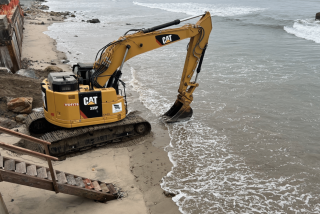Judge Urges Record Penalty in Coast Case : Environment: $9.8-million judgment is proposed against man accused of selling Malibu land without warning buyers about building limits.
- Share via
In what would be the largest penalty ever imposed for a violation of the state coastal protection law, a Los Angeles judge has proposed a $9.8-million judgment against a man accused of selling 19 parcels of land in Malibu without telling buyers that deeds to the property carried restrictions preventing development.
The decision by Superior Court Judge Ruth Essegian would also require former Hollywood businessman Peter D. Bogart to repay more than $200,000 to about two dozen people who bought the vacant, environmentally protected lots, which were allegedly auctioned by Bogart through several sham entities.
The state Coastal Commission contends that Bogart paid less than $1,000 apiece for the parcels and sold each for up to 18 times that amount.
The judge’s tentative decision does not become official until a judgment is declared. However, lawyers for the state, who were instructed by the judge to prepare the document for her approval, described that as a ministerial act that would occur within several weeks.
Commission officials on Tuesday hailed the decision as a milestone for coastal protection.
“(It) sends a loud and clear message to violators of the Coastal Act that we will move vigorously against them,” said Peter Douglas, the agency’s executive director.
Bogart’s attorney defended his client’s actions and accused the coastal panel of engaging in a “blood feud” against Bogart in retaliation for his suing the commission three times in 1992.
“No waterways were obscured, no endangered species were exterminated, no land was paved, no beaches were walled,” said William W. Bloch, the attorney. “It’s very clear that something else . . . is involved here.”
The $9.8-million judgment that the judge proposes would dwarf any previous penalties exacted for violations of the state’s 1976 coastal protection law. In 1992, the commission obtained a $1-million settlement against a developer for illegally grading a Malibu hillside.
The agency’s entire budget for the current fiscal year is $9.1 million. By law, money collected as the result of penalties goes into a fund to repair environmental damage along the state’s 1,100-mile-long coastline.
Deputy Atty. Gen. Daniel A. Olivas said the state intends to use “any means at our disposal” to collect the money, including foreclosure on any development real estate that Bogart owns.
“Based on the elaborate brochures we’ve seen, it would appear that Mr. Bogart is someone with quite a bit of property,” Olivas said.
Investigators--who say Bogart’s whereabouts are unknown--said he used slick sales brochures to lure unsuspecting buyers into buying the properties as sites to build homes.
The case against Bogart involves lots in Malibu’s Latigo Canyon that were part of the commission’s 15-year-old “transfer of development credit” program.
The complex program works by allowing developers to buy up development rights to mountain land within the five-mile-wide coastal zone that the commission wants to preserve. The owner accepts the cash and places restrictions on the property. For participating in that protection, the developer is awarded credits by the commission that make it easier to obtain approval for other coastal projects.
In the Bogart case, he is accused of disregarding the law when he sought to resell restricted parcels he had bought in 1991.
After being alerted by a tipster that Bogart was selling the properties as home sites, the commission issued a cease-and-desist order in August, 1992. At the time, investigators said, Bogart had already sold the 19 parcels.
Bogart then sued the Coastal Commission, contending he had the right to sell the properties.
“He basically preyed on people who thought they could get a bargain price on lots to build their dream homes,” Olivas said.
Investigators said Bogart set up a land auction at a hotel in the City of Commerce, wooing unsuspecting buyers with once-in-a-lifetime bargains on mountain properties offering spectacular ocean views.
In sales material, he sought to deflect any doubts about whether there might be any problem with development, investigators said.
According to attorneys for the state, one brochure described the parcels as “unbelievably cheap, due to restrictions on development. Economists tell us that government is broke and that only development can fill the bureaucrats’ maw. They’ll have to develop.”
Paul and Donna Ragusa of Eagle Rock, who paid $16,000 at an auction in 1991 for a quarter-acre parcel overlooking the ocean, were among the unsuspecting buyers.
“I saw the ad in the newspaper, went up and looked at it, and it was love at first sight,” said Donna Ragusa, a nurse.
She was delighted to learn about the decision involving Bogart.
“Boy,” she said, “did we ever learn our lesson.”
More to Read
Sign up for Essential California
The most important California stories and recommendations in your inbox every morning.
You may occasionally receive promotional content from the Los Angeles Times.









